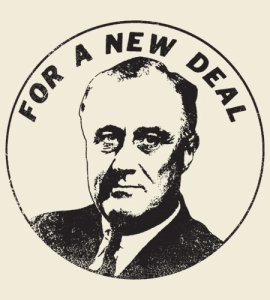 In the era of the New Deal, Franklin Roosevelt saw several cherished reforms get thrown out by the Supreme Court. On this day in Supreme Court history, May 27, 1935, three separate decisions were handed down which struck against Roosevelt’s power.
In the era of the New Deal, Franklin Roosevelt saw several cherished reforms get thrown out by the Supreme Court. On this day in Supreme Court history, May 27, 1935, three separate decisions were handed down which struck against Roosevelt’s power.
One, Humphrey’s Executor v. United States, declared that Roosevelt could not dismiss regulatory appointees (in this case a member of the Federal Trade Commission) for political reasons alone. Only in the case of crimes or gross neglect could a President do so. Secondly, in Louisville Joint Stock Land Bank v. Radford, the Court determined that a recent law went too far in protecting indebted farmers vs. the contractual rights of creditors to foreclose. And finally, in Schechter Poultry Corp. v. United States, the Court invalidated the National Industrial Recovery Act (NIRA) for conferring too many open-ended powers on the Executive branch. This final decision struck Roosevelt the hardest, as the NIRA had been a central piece of the New Deal regulations.
In Schechter Poultry Corp. v. United States, a kosher chicken dealer sued the government, charging that the NIRA was unconstitutional. The case tested the legality of certain methods used by Congress and President Roosevelt to combat the devastating economic effects of the depression.
The Court held that delegation of the authority to regulate interstate commerce to local or private bodies is a violation of the separation of powers doctrine. It delegates too much authority to the Executive; it effectively takes the power to legislate from Congress and gives it to the Executive Branch.
The Supreme Court struck down as unconstitutional a provision of the NIRA that authorized the President to approve “codes of fair competition” for the poultry industry and other industries. These codes regulated schedules of minimum wages, prices, maximum work hours, collective bargaining, and other rules that would be binding upon entire industries. Drawing upon the nondelegation doctrine and the Commerce Clause of the Constitution, the Court struck down this piece of President Franklin Roosevelt’s New Deal legislation. First, the Court characterized this activity as intrastate transactions with effects that were only indirect in the sphere of interstate commerce. Thus, Congress had overstepped its bounds by regulating local commercial activity. Second, by giving the Agency for Industrial Recovery a broad mandate to ensure “fair competition,” Congress had effectively delegated legislative power to the Executive. This Congress could not do. The Court found an absence of standards and procedures in the statute to guide the President in deciding which regulations to impose upon various industries.
Under the Commerce Clause, Congress had the power to regulate commerce between the states, not intrastate commerce. The power to enact legislation on intrastate commerce was reserved to the states under the Tenth Amendment to the Constitution. According to the Court, the business conducted by the Schechters was decidedly intrastate. Their business was licensed in New York, they bought their poultry in New York, and they sold it to retailers in New York. Because it was intended to reach intrastate businesses like Schechter Poultry, the Live Poultry Code regulated intrastate commerce, and it was therefore an unconstitutional exercise of congressional power. The Court reversed the Schechters’ convictions and declared the Live Poultry Code unconstitutional.
Moreover, the Court reviewed the indirect versus direct nature of the regulation, finding that it was more indirect. Indirect regulations of interstate commerce are reserved for the states, while regulations with direct impact on interstate commerce are reserved for Congress. Plaintiff in this case almost exclusively bought chickens from in-state suppliers and sold to in-state customers. The impact of Plaintiff’s activities on interstate commerce, therefore, was indirect. Congress should not have the authority to regulate activities with indirect impact on interstate commerce, as their power to regulate would be essentially limitless.
The NIRA was the centerpiece of Roosevelt’s plan to stabilize the national economy, and the government’s loss in the Sick Chicken case marked the end of the NIRA and its fair trade codes. After the U.S. Supreme Court declared the methods unconstitutional, Roosevelt publicly scolded the Court declaring that the Court’s “horse-and buggy definition of interstate commerce” was an obstacle to national health. He later used the decision as one justification for a controversial plan to stock the Court with Justices more receptive of Roosevelt’s programs.
